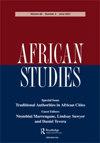Men’s Emic Perspectives on Factors Contributing to Child Sexual Abuse Vulnerability on the Islands of Western Kenya
IF 1
4区 社会学
Q2 AREA STUDIES
引用次数: 1
Abstract
ABSTRACT Child sexual abuse (CSA) is a major global health concern. Although it is prevalent in Kenya, there is scant literature on what factors contribute to CSA vulnerability on Kenya’s islands. This paper is based on a cross-sectional study of men’s perspectives on factors contributing to CSA vulnerability on Kenya’s islands. This qualitative study, therefore, focused on opinion leaders, children’s officers, male community members, and boat owners from selected islands (Mageta, Magare, Oyamo and Ndeda) in western Kenya. Several factors emerged as contributing to CSA vulnerability on the islands: social stigmatisation and cultural sensitivity of CSA, proximity to social services, unrestricted migration, perceptions of legal costs, lack of committed witnesses, and commodification of sex for economic survival. This article recommends a local, targeted campaign for these fishing communities that promotes common goals, such as a safe and healthy environment for children, and working together to achieve these goals. Such a campaign has the potential to bring together a community to fight CSA and to increase its bargaining power to reduce CSA vulnerability. When a community does not agree on shared principles and expectations, deviant behaviour such as CSA has room to flourish, because community members cannot effectively organise themselves against it. It is hoped that the findings in this article might contribute some key insights on vulnerability experienced in remote areas that might be used by policymakers.男性酋长国对肯尼亚西部岛屿儿童性虐待脆弱性因素的看法
摘要儿童性虐待(CSA)是全球关注的一个主要健康问题。尽管它在肯尼亚很普遍,但关于肯尼亚岛屿上CSA脆弱性的因素,文献很少。本文基于对肯尼亚岛屿上男性对CSA脆弱性因素的看法的横断面研究。因此,这项定性研究的重点是来自肯尼亚西部选定岛屿(Mageta、Magare、Oyamo和Ndeda)的意见领袖、儿童事务官员、男性社区成员和船主。有几个因素导致了CSA在岛屿上的脆弱性:CSA的社会污名化和文化敏感性、接近社会服务、不受限制的移民、对法律成本的看法、缺乏坚定的证人以及为了经济生存而将性商品化。本文建议为这些渔业社区开展一场有针对性的地方运动,促进共同目标,如为儿童创造一个安全健康的环境,并共同努力实现这些目标。这样的运动有可能使社区团结起来对抗CSA,并提高其议价能力,以减少CSA的脆弱性。当一个社区没有就共同的原则和期望达成一致时,CSA等越轨行为就有蓬勃发展的空间,因为社区成员无法有效地组织起来反对它。希望本文的研究结果能为决策者提供一些关于偏远地区脆弱性的关键见解。
本文章由计算机程序翻译,如有差异,请以英文原文为准。
求助全文
约1分钟内获得全文
求助全文

 求助内容:
求助内容: 应助结果提醒方式:
应助结果提醒方式:


